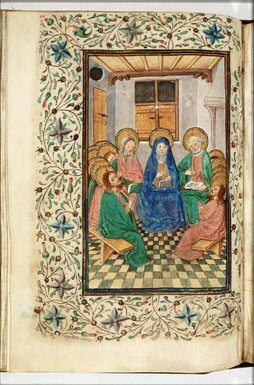Reading, Writing, Collecting: Miscellanies and Private Libraries
The objective of this project is to investigate the process of reading, writing and collecting religious knowledge in the late medieval urban cityscape, through the analysis of a selected corpus of vernacular manuscript miscellanies with a specific religious connotation, as well as of archival sources about late medieval personal libraries and book collections.
One of the most “visible” manifestations of the new approach to knowledge is the process of collecting texts and books, in the form of miscellanies and private and semi-private libraries. These sources will be studied as “snapshots” of a dynamic textual culture as well as tokens of the process of appropriation of textual knowledge. This is particularly true and relevant in the case of religious miscellanies such as those selected for investigation: those copied and owned by non-professional scribes and lay users. Two important features of these miscellanies must be taken into consideration:
- Colophons and ownership marks in religious miscellanies compiled and owned by non-professional users are extremely informative about how scribal and reading practices were influenced by configurations of personal devotion, as well as by participation in textual communities and cultural networks. These activities stimulated a process of domestication and appropriation of religious knowledge.
- This process of collection also implies a redistribution of religious material through the circulation of manuscripts (which creates a continuous process of reading and copying) and through the creation of public and semi-public book collections open to large groups of participants in the knowledge network.

Late medieval religious miscellanies – in particular manuscripts copied and owned by individual laypeople – have not garnered much scholarly interest in their own right, and have been merely studied from the material, textual and philological point of view of codicologists and literary historians focussing on the transmission of specific texts or text-clusters. In spite of the clear re-evaluation of the importance of miscellanies over the past few years in Dutch and European scholarship (edition projects of vernacular miscellanies at Huygens-ING and the HERA-project “The Dynamics of the Medieval Manuscript: Text Collections from a European perspective”; KNAW-colloquium “Late Medieval Personal Miscellanies”, 1-3 October 2014, organised by the main proposer), the specific function of personal miscellanies is still a desideratum. In particular, seldom have attempts been made to approach miscellanies from a more social and historical point of view and as important steps in the creation and the development of late medieval literate and religious mentality.
The inclusion of social and historical aspects in the evaluation of the research corpus will lead to a new approach to the study of late medieval transmission of religious knowledge. More specifically:
- Moving from a text-centred to a scribe-, reader-, and user-centred approach to late medieval religious miscellanies, the project will investigate cultural and religious transformation in the late medieval Low Countries and will significantly contribute to a better-calibrated and more nuanced understanding of cultural and religious life in the late medieval Low Countries.
- It will moreover add a new and culturally particularly relevant dimension to the results of recent quantitative research on literacy, book production and construction of social and cultural capital by stressing the possibility of participation in religious life through the process of reading, writing and collecting.
Preliminary research has indicated at least two important research lines, which will be further investigated in the project:
- the religious, affective and spiritual aspects of collecting and copying religious texts for personal use, an action that transforms the scribe into an agent in the process of creation and distribution of religious knowledge;
- the traces left in this process by ongoing forms of collaboration and exchange with other devotees and with religious individuals, groups and institutions, leading to the creation of “local theologies” and of a shared religious culture, in which religious and lay alike are participating. There is indeed evidence of book and text exchange between religious individuals and communities and laypeople, and the creation of lay-religious networks of book exchange in which laypeople are at times playing a leading role.
The focus on these two specific research lines will be combined with and corroborated by the study of the organisation and constitution of late medieval private of semi-private libraries, as well as of the bequeathing of religious manuscripts (and in some cases early printed texts) to religious and civic institutions in order to create facilities for borrowing, reading and copying books. The accurate and systematic reconstruction of these initiatives, meant to enlarge the numbers of possible readers and users involved in the appropriation, domestication and transmission of religious knowledge, will lead to a better-balanced and dynamic reconstruction of late medieval transmission of religious textual culture.
| Last modified: | 28 November 2017 3.17 p.m. |
